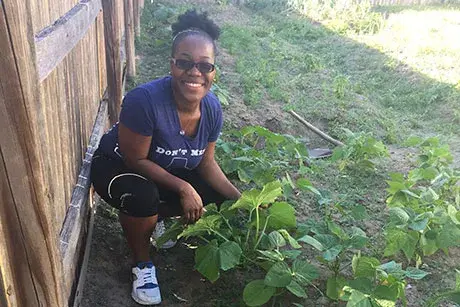From Farm to School
Tappa's goal? To blend public service and business law -- bringing small farmers and elementary schools together to help kids develop healthy eating habits.

Linda Tappa ’17 stood among onion fields in Texas’s Rio Grande Valley, surveying rows of green shoots sprouting from the earth as workers hustled along, pulling bulbs to fill their barrels before sundown. As she watched the astounding bustle, a small farm owner explained his concerns about being successful on his own and how much pressure there is on the little guy to grow huge crops in order to be competitive among the big farms that are more emblematic of Texas.
He was just one of a handful of small farmers Tappa met with that summer, and his feedback helped Tappa begin developing a farm-to-school program across rural Texas while also gaining the opportunity to connect her academic focus in corporate law with her passion for community-based public interest work.
“This was a brainchild of mine that started off as a leap of faith and developed the more I worked on it,” said Tappa, a native of Yaoundé, Cameroon, who moved with her family to Austin as child. “There’s a lot of energy and excitement for this program to be implemented, and it’s something that’s really needed. My goal is to bring together small farmers to be successful as a collective, and to target elementary schools because eating habits develop at a young age.”
By working through RWU Law’s Office of Career Development, she secured an internship last summer with Texas RioGrande Legal Aid (TRLA) to launch a farm-to-school program via Texas C-BAR (Community Building with Attorney Resources).
According to the Texas Department of Agriculture, the state leads the nation in number of farms and ranches, employing one out of seven working Texans on farms and bringing in an average of $20 billion annually from agricultural products. Meanwhile, the state is facing an obesity epidemic, which got Tappa thinking about how she could encourage healthier lifestyles for Texas youth while helping out the small farmers and migrant laborers who wanted to carve out their own piece of the American dream.
The federal farm-to-school grant program had launched a few years earlier, but not many small farmers or school districts knew how to take advantage of it, she said. That’s where she decided to step up for her adopted state – where she also hoped to return to work after graduating in May.
Backed by her hands-on experience in transactional law via the Business Start-up Clinic (BSUC), Tappa determined that a collective would be the most effective business entity and began drafting documents and connecting with farmers, food distributors and school administrators. Before the BSUC, she had packed in plenty of experience in pro bono work and courtroom practice, spending a spring break with the Bronx Public Defenders, a summer at the Federal Public Defenders program in Providence, and participating in moot court and trial advocacy competitions.
“Being able to work on the for-profit side was a whole other beast from a nonprofit experience,” Tappa said. “I was really glad I got that exposure in the BSUC prior to launching into the real world, because it would have been a steep learning curve otherwise. In Professor Ahern’s clinic, you’re learning and applying your knowledge as you go.”
In the BSUC, students provide free services to research and counsel small-business and nonprofit clients on everything from choosing a business incorporation to trademarking a brand. According to Business Start-up Clinic Director Katie Ahern, it’s a powerful example to students of how transactional law can play a major role in helping a community grow.
“Students become invested in their clients’ work – not just tackling concrete issues but also helping to identify and navigate different options and planning with the client,” Ahern said. “They’re helping to launch a business, in most cases, and they’re having a big effect on how those businesses are shaped from the very beginning. The work in this clinic really ingrains in the students what a positive effect business lawyers can have on a community, and hopefully encourages them to continue service to the community when they begin to practice law.”
For Tappa, it was exactly the kind of experiences she was hoping to gain in law school and one of the reasons she chose RWU Law, with its focus on pro bono work and clinical experiences to provide a foundation in service and practice beyond the rigorous academic studies. Less than a year later, it landed her in her dream job.
Before she had even graduated, Tappa was offered a staff attorney position with the executive director of Texas RioGrande Legal Aid. Her first task? Completing what she started and bringing the farm-to-school program to school districts in the Southwestern part of the state.
“I had always wanted to go into corporate law to make enough money and then become an international human rights defender,” said Tappa. “I’m more public-interest focused than anything else, and this work is combining both worlds in a way that I didn’t know intersected in the legal field until RWU Law. I’ll be helping small farmers identify and grow a source of revenue, while encouraging young students to develop an appreciation for vegetables and to learn more about how and where their food is made. That’s what makes me so passionate about this idea.”
